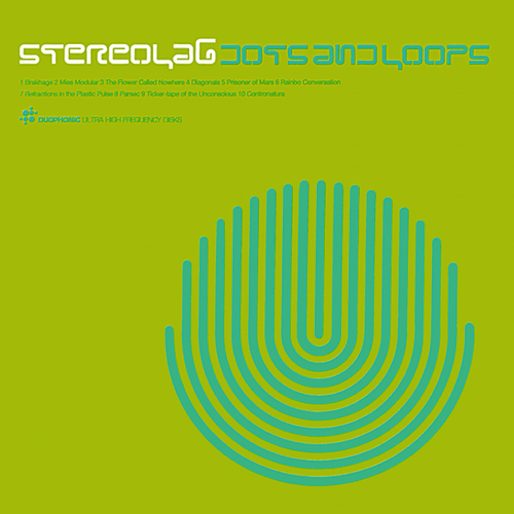Stereolab Go Back to the Lab on Emperor Tomato Ketchup, Dots and Loops and Cobra and Phases Group Play Voltage in the Milky Night Expanded Editions
Stereolab continue their ambitious reissue campaign with extras-loaded editions of their pivotal late-’90s output

In 2015, speaking as the featured guest at a Red Bull Music Academy event, Stereolab frontwoman Lætitia Sadier called music journalists “lazy” for placing the band’s unique style into the box-like category of “retro-futurist pop.” Sadier had a point: Stereolab’s body of work adds up to more than just an amalgamation of stylishly retro influences. To be fair, though, the band also wore those influences on its collective sleeve, very consciously referencing not just the past, but the aesthetics of bygone art movements that looked ahead to the future in a way that seemed quaint once the late 20th century had actually arrived. One of the band’s EPs, for example, uses the term “Space Age Bachelor Pad Music” in its title. If music journalists were in fact being lazy, they were only taking the bait the band dangled in front of everyone.
Even the name Stereolab, drawn from a 1960 compilation album of sounds released by Vanguard Records for the purpose of testing then-high end home stereo equipment, was an intentional reference to “new” technology from a decades-old vantage point. So when bandleader, guitarist, chief composer and driving force Tim Gane formed Stereolab with Sadier at the dawn of the ’90s, Gane’s innovative blend of lounge/exotica, bossa nova, krautrock and the influence of pioneering electronic composers like Jean-Jacques Perrey and Gershon Kingsley set the band apart as a hip alternative to the burgeoning alternative underground. At the same time, for the first six years of the band’s existence, Gane emphasized guitar distortion in a way that tied them to their rock peers, many of whom ( Stereolab included) were operating with one foot in the major label system and the other in the indie world.
In that same Red Bull interview from four years ago, Sadier revealed that an ambitious reissue campaign was already underway , and that it would take a long time to sort out all the logistics. Fast-forward to May of this year, when Stereolab reissued their second and third full-length albums—1993’s Transient Random-Noise Bursts with Announcements and 1994’s Mars Audiac Quintet—to coincide with their first tour following a ten-year hiatus. The latest installment in the reissue series consists of the band’s three full-lengths from the late-’90s: Emperor Tomato Ketchup (1996), Dots and Loops (1997) and the extravagantly titled Cobra and Phases Group Play Voltage in the Milky Night (1999). All three titles now come newly remastered and loaded with bonus material, including demos, stray b-sides, alternate mixes, etc. (Between them, the three sets come with 46 bonus tracks totalling over two hours of extras.)
This middle period of the band’s history was marked by a series of pivotal changes. For one, Emperor Tomato Ketchup would be the first of four albums in a row produced by John McEntire of the Chicago post-rock outfit Tortoise. Not coincidentally, Dots and Loops introduced the band’s audience to the technique of recording two sets of drum parts, each hard-panned to one side of the stereo field—a signature of McEntyre’s production style that would also become a Stereolab hallmark. (In fact, if not for the absence of vocals, the 1996 Tortoise instrumental “Glass Museum,” with its overlaying of hand percussion, drums and vibraphone, could easily be mistaken for a lost track off Emperor Tomato Ketchup). Dots and Loops also saw Gane significantly dial-back the distortion for the more spacious, airy sound that would define all of their work from that point on.
Perhaps most significantly, though, Dots and Loops was the point where the band exited the autobahn of repetitive, Neu!-inspired motorik grooves, heading out in its own direction once and for all. Before Dots and Loops, Stereolab had certainly thrown together an unusual recipe of musical styles but hadn’t necessarily hit on the most imaginative ways to combine those to arrive at fresh flavors. Grafting Equivel to avant-garde composition might have looked like a promising departure point, but Stereolab hadn’t necessarily risen above a mashup mentality yet. Sure, Sadier and late guitarist Mary Hansen wove their vocal parts together into a sweet, often breathtaking tapestry that instantly set the band apart and made Emperor Tomato Ketchup tunes like “Les Yper Sound” and “Spark Plug” soar. But Gane’s approach to the music underneath was undeniably linear and, by 1996, becoming predictable.
-

-

-

-

-

-

-

-

-

-

-

-

-

-

-

-

-

-

-

-

-

-

-

-

-

-

-

-

-

-

-

-

-

-

-

-

-

-

-

-








































